Editorial
Flutters of flag and pangs of hunger

Friday 4th February, 2022
The government has pulled out all the stops to hold the Independence Day celebrations on a grand scale while the country is sinking deeper into crisis. Today, political leaders will arrive at the Independence Square, in their limousines, puff out their chests and sing the national anthem with gusto. There will be a colourful parade with the military flaunting its assets. A fly-past will be the main attraction of the event. Political rhetoric will burst forth. We see this grand show year in year out.
Sri Lanka could hardly afford today’s big show. What is there to be celebrated, anyway? Funds for the ceremony have come from a depleted Treasury struggling to pay for food imports. The country remains underdeveloped and a huge burden on other nations; it borrows from even its developing world counterparts! Essential commodities are in short supply, and many people are skipping meals.
The celebration of ‘Independence’, however, is a time for reflection. Perhaps, the fate of the Trincomalee oil tank farm exemplifies the predicament of post-Independence Sri Lanka better than anything else. In early 1960s, during an SLFP-led administration, we were able to buy this strategically important asset built and owned by the British, but successive governments failed to maintain it, and today a part of it has been leased to India, which has also acquired a sizeable stake in a joint venture to manage the majority of tanks. A UNP government built the Gal Oya reservoir with local funds, but today not even a sewer could be constructed without foreign aid. Instead of rehabilitating ancient irrigation tanks and canals, and building new ones to feed the hungry and achieve national food security, projects are being launched to convert tank bunds into jogging tracks.
The current foreign currency crunch, which has crippled the economy, has come about as successive governments since 1977 have got the country’s investment priorities wrong. There is a tall tower in Colombo City and it is illuminated from time to time as if to glorify the monumental stupidity of our rulers who in their wisdom borrowed heavily from external sources for its construction, not caring how they were going to pay back the loans. The tower, too, is also likely to go under the hammer before long.
There has been no long-term strategy or a sustained effort to develop the economy and achieve the much-needed fiscal consolidation. Instead, vital assets including those built with borrowed funds are being sold or leased to raise funds for debt repayment. As for the debt crisis, the only solution that all governments could think of is to borrow more, and the self-proclaimed patriots who have been at the levers of power have not cared to make a serious attempt to break this vicious circle. They, too, have feathered their nests while wrapping themselves in the flag. It is popularly believed that if they were made to return to the state coffers a fraction of what they have helped themselves to and stashed away in offshore accounts, the country’s financial woes would disappear in next to no time.
Time was when Sri Lanka exchanged its rubber for rice from China, which is today donating rice to help dull pauperised Sri Lankans’ pangs of hunger. There have been some achievement, but, overall, we have lost our way.
The challenge before us is to retrace our steps, figure out where we took wrong turns, and forge ahead in the right direction as many other nations have already done. Easier said than done, but there seems to be no other way.
Editorial
Seeyanomics, rhetoric and reality

Monday 23rd December, 2024
The much-awaited good news has come at last. On Friday, Fitch Ratings upgraded Sri Lanka’s Long-Term Foreign-Currency Issuer Default Rating (IDR) to ‘CCC+’, from ‘RD’ (Restricted Default). Heartening as this positive development is, it by no means indicates that the Sri Lankan economy is out of the woods yet; what it signifies is that the economic crisis management measures are yielding desired results, but there is much more to be done for full recovery to be achieved.
Sri Lanka’s bankruptcy was an orphan, but the rating increase has many fathers, including the NPP leaders, who try to justify their inability to find immediate solutions to other burning issues such as the escalating prices of rice and coconuts by claiming that ‘children are not born immediately after honeymoons’.
Sri Lanka’s rating improvement is no mean achievement, and the credit for it should go to the ordinary people, who have been bearing untold hardships in the name of economic recovery, the IMF, other lending institutions, the countries such as India, which granted much-needed loans for the procurement of essentials to prevent this country from descending into anarchy, the officials of the Finance Ministry and the Central Bank, and former President Ranil Wickremesinghe, who had the courage to adopt unpopular yet essential measures to tackle the economic crisis.
Ironically, the amount of Sri Lanka’s foreign debt which has been restructured is almost equal to what the UNP-led Yahapalana government borrowed, according to what ousted President Gotabaya Rajapaksa has said in his book, ‘The Conspiracy’ (p. 25). Rajapaksa says the UNP-led government (2015-2019) issued International Sovereign Bonds (ISBs) to the tune of USD 12 bn, and towards the end of 2019, the country’s outstanding ISBs amounted to about USD 15 bn, and its total foreign reserves were at USD 7. 6 bn whereas at the end of 2014, when the Mahinda Rajapaksa government collapsed, the outstanding ISBs totalled only USD 5 bn.
If so, one can argue that Wickremesinghe has only helped right a wrong the Yahapalana government committed. The JVP backed the UNP-UPFA coalition, which was on a borrowing spree, and propped up the UNP, after the UPFA’s breakaway in 2018, although the JVP leaders and Wickremesinghe are at daggers drawn at present.
The holier-than-thou SJB bigwigs were in the Yahapalana Cabinet, which was responsible for reckless borrowing. The TNA, the SLMC, etc., also supported the Yahapalana administration, especially the UNP. The SLPP bankrupted the economy. Thus, no party represented in the current Parliament can absolve itself of the blame for the country’s economic crisis.
The JVP-led NPP has stooped so low as to resort to ageism in a bid to ridicule Wickremesinghe; it calls him a seeya (grandpa) with his productive years behind him, but his ‘seeyanomics’ seems to have worked, and it is now up to the NPP leaders who consider themselves youthful, in spite of being in their 50s, 60s and 70s, to ensure that the current economic recovery process will stay on course.
What they as well as the Opposition must do is to stop playing politics with the ongoing bailout programme. Thankfully, the NPP has realised the gravity of the economic situation since its ascent to power and refrains from carrying out some of its election promises, the implementation of which would have caused a drastic drop in state revenue. But it will have to ensure that its relief programmes are properly targeted.
The Opposition, especially the SJB, should also act responsibly, without trying to earn brownie points with the public at the expense of the economic recovery efforts. It should stop pressuring the government to do things that are bound to entail heavy economic costs, such as haphazard tax cuts, huge pay hikes for the public sector workers and ad hoc relief measures.
That the NPP made a host of Machiavellian promises, while in opposition, to capture power is no reason why the SJB, etc., should try to make the incumbent government do what will stand in the way of economic recovery.
Meanwhile, the government has unveiled a proposal to effect PAYE tax reductions and increase the withholding tax (WHT) from 5% to 10%. It says those who receive less than Rs. 150,000 a month by way of interest income will not be affected by the WHT hike, but the proof of the pudding is said to be in the eating.
Now that the government has promised tax relief to professionals, it must ensure that the state employees who will benefit from the proposed PAYE reductions earn their keep by working diligently; they must be made to use biometric attendance marking systems like other workers, and their outputs should be regularly assessed.
Editorial
The games they play

The new parliament, packed with first timers as never before, had an interesting session last week with the dust yet unsettled over the issue of the last speaker’s doctorate. Now plain MP Ranwala who resigned from his august position, which ranked him number three in the national protocol list, has not admitted any malfeasance or skulduggery. He says his instant problem is an inability to quickly get clear proof of his qualification from Waseda, a private university in Japan with an affiliate research institutes, one of which he claims awarded him the disputed degree. This has been rubbished by critics saying we live in an age of instant communications. However that be, the ex-speaker is widely accused of flaunting a qualification he did not possess and the government which proposed him for the jb continues to draw flak on this matter. Whether his resignation was a command performance or voluntary remains unclear. After he gave up his wig and robes, there have even been demands that he resigns from parliament as he allegedly presented himself to the electorate with a qualification he did not possess.
Gone are the days when leftist giants of the past like Dr. NM Perera who earned a DSc. degree from the London University and Dr. Colvin, R. de Silva who earned a PhD from the same university strode the legislature and were recognized countrywide for their erudition. There was also the unforgettable W. Dahanayake from Galle, who succeeded the late SWRD Badaranaike as prime minister when the latter was assassinated. He called himself Dr. Wijayananda Dahanayake after he was conferred a doctorate honoris causa by the Vidyodaya University. He as Minister of Education, raised Vidyodaya and Vidyalankara from pirivena to university status and this was recognized by the conferring of the honorary degree.
Although some honorary doctorate holders use and have used the title, others desisted, restricting themselves to using it only in their curriculum vitae with the specific notation of honoris causa. We even had the notorious Mervyn Silva flaunting a so-called doctorate from the Institute of Alternative Medicine founded by the late Dr. Anton Jayasuriya who was a western qualified medical practitioner and a well know acupuncturist. His institute freely distribution of doctorates and all manner of persons were decorated with them.
There was a time in the past when a well know surgeon of yesteryear insisted that he be called Mr. Muller rather than Dr. Muller as he did not hold a Doctor of Medicine degree. In our country and many others holders of the MBBS (Bachelor of Medicine, Bachelor of Surgery) degree call themselves doctor although they hold no MD (Doctor of Medicine) qualification. In more recent years we have seen engineers, architects, attorneys-at-law and the like prefixing their names with Eng, Archt, Attorney-at-Law etc in front of their names obviously reacting to the Dr. prefix used by medical practitioners.. In fact, first time MP Dilith Jayaweera pertinently raised the question of why such appellations be used at all in Parliament. Why indeed? In fact many MPs commonly prefix their names with “Honorable,” a traditional nicety within the parliamentary chamber, quite needlessly and irrelevently outside that chamber. Cynics would say many of them are anything but honorable!
Apart from the Ranawala ruckus, the last week in parliament saw a lot of ha ho about titles used by various MPs. Justice Minister Harshana Nanayakkara accused SJB MP Ajith Perera of calling himself Adhinithigna (Advocate) though the two branches of the legal profession, Advocates and Proctors, were fused to into a single branch of Attorneys-at-Law in 1973 when Perera would have been all of five years old! This resulted in a lot of angry back and forth and hair splitting about the Sinhala word “counsel.” Nanayakkara said he was once a state counsel or Rajaye Adhinithigna. An old story about Namal Rajapaksa being helped through his final law exam was resurrected with Minister Wasantha Samarasinghe quoting a batch mate of Rajapaksa who made the original allegation and thereafter fled to Switzerland in fear of his life. This worthy, with whom the minister is in contact, apparently is willing to cooperate with any fresh inquiry. Rajapaksa said he would resign if the allegation is proved and challenged the accusor-minister to do likewise if it is not proven.
Opposition Leader Sajith Premadasa made a long explanation about his education beginning at the nursery stage at St. Bridget’s Convent, through St. Thomas’ Prep and Royal College. He admitted he had no GCE ‘OL’ from Sri Lanka as he had gone abroad and said he passed both the ‘O’ and ‘A’ Level exams in the UK. He had a degree from the London School of Economics and postgraduate qualifications from the US. Premadasa displayed a framed certificate in the chamber and said that he was tabling all documents for Hansard.
Apart from this, Health and Media Minister Nalinda Jayatissa read out a list of MPs who had benefited from the President’s Fund to pay medical bills and have since promised to make new revelations in the future. Former President Ranil Wickremesinghe, with nobody in parliament to speak on his behalf, had issued a press statement in this regard. The Daily Mirror on Friday headlined this report “None were given over Rs.1 million outside procedure except on one occasion: RW.” Wickremesinghe had indicated that there were may “personal requests” for assistance but did not expand.
The Fund set up by law in 1978 during the JR Jayewardene tenure was initially funded from donations and partly supported by the Development Lottery. There is very little information in the public domain on the subject but it has long been felt despite it being set up for the poor, many of the rich had benefited including progeny of the well-to-do sent to leading universities abroad at the fund’s expense. Given the current interest generated on this subject, it would be sensible to publish all disbursements and annual accounts as there is good reason to suspect that it is a means of patronage.
Editorial
Ranil’s advice

Saturday 21st December, 2024
Former President Ranil Wickremesinghe has urged the SJB-led Opposition to act responsibly and help ensure the continuity of the IMF bailout programme, which has enabled the economy to regain some stability. He has also thanked the NPP government for having kept the IMF programme on course.
Wickremesinghe’s exhortation to the Opposition and unsolicited advice to the government are timely but not devoid of politics. He is seeking the credit for what the country has achieved through the ongoing IMF programme, which got underway in earnest under his presidency. In fact, it is doubtful whether any other President would have had the courage to make a host of unpopular yet essential decisions to address the economic crisis. So, Wickremesinghe is not without a moral right to ask the government and the Opposition to act prudently and help the country make the most of the IMF programme. It is hoped that the Opposition and the government will heed Wickremesinghe’s advice and act accordingly.
Sadly, the SJB has chosen to play to the gallery, asking the government to renegotiate the IMF programme. It could not even sort out an internal dispute over its National List appointments, and one of its constituents resorted to legal action. So, how can such a political party claim to be able to make the IMF bend to its will? It is obviously trying to earn brownie points with the public by bellowing rhetoric.
The IMF programme is no economic panacea, but it will surely help Sri Lanka gain economic stability in the short-term. It has already yielded some tangible results. Much more remains to be done to ensure Sri Lanka’s long-term economic wellbeing, and it is up to the current dispensation as well as future governments to develop the economy and achieve debt sustainability.
Nobody likes IMF bailout conditions, which can be extremely harsh, but they are a prerequisite for a bankrupt country’s economic recovery. If Sri Lanka managed its economy properly, it would not have had to ask for IMF help, which comes with constricting conditions. However, what the IMF has prescribed is what Sri Lanka should have done on its own a long time ago.
When a country spends more than it earns and goes on borrowing recklessly from external sources to meet its revenue shortfall, it runs the risk of facing an economic crisis. The Mahinda Rajapaksa government indulged in wasteful expenditure; it spent a great deal of borrowed money on Ozymandian projects. The UNP-led Yahapalana government also borrowed heavily. The JVP backed that administration to the hilt. The Gotabaya Rajapaksa administration, in its wisdom, slashed taxes and tariffs, oblivious to the disastrous consequences of its harebrained action. The Covid -19 pandemic came, necessitating prolonged lockdowns, which took a heavy toll on the economy. The rest is history.
A person who falls into a well has to come out of its mouth, as a local saying goes. There is no other way out. Sri Lanka finds itself in a similar situation. Having ruined the economy, it found itself at the bottom of an economic pit. Thankfully, in answer to its pitiable pleas, the IMF threw a lifeline, which has enabled it to come halfway up. Needless to say, nothing will be stupider than for it to let go of that lifeline.
-
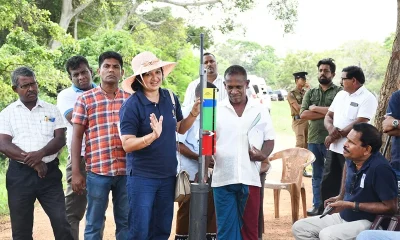
 News6 days ago
News6 days agoInnovative water management techniques revolutionising paddy cultivation in Lanka
-
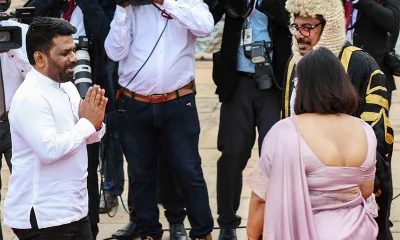
 Features5 days ago
Features5 days agoThe Degree Circus
-
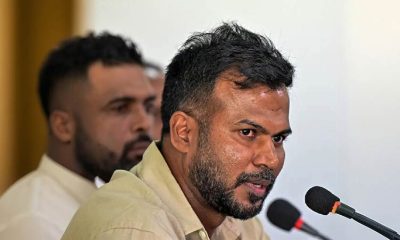
 Sports3 days ago
Sports3 days agoSri Lanka to mend fences with veterans
-

 Opinion5 days ago
Opinion5 days agoHas ‘Compass’ lost direction?
-

 Editorial6 days ago
Editorial6 days agoA supreme irony
-
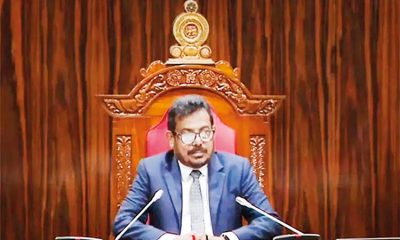
 Opinion6 days ago
Opinion6 days agoDocs, Speakers and Profs
-
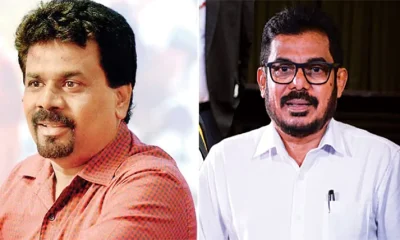
 Features6 days ago
Features6 days agoGovt.’s anti-corruption agenda gets boost
-

 Sports1 day ago
Sports1 day agoPathirana set to sling his way into Kiwi hearts











